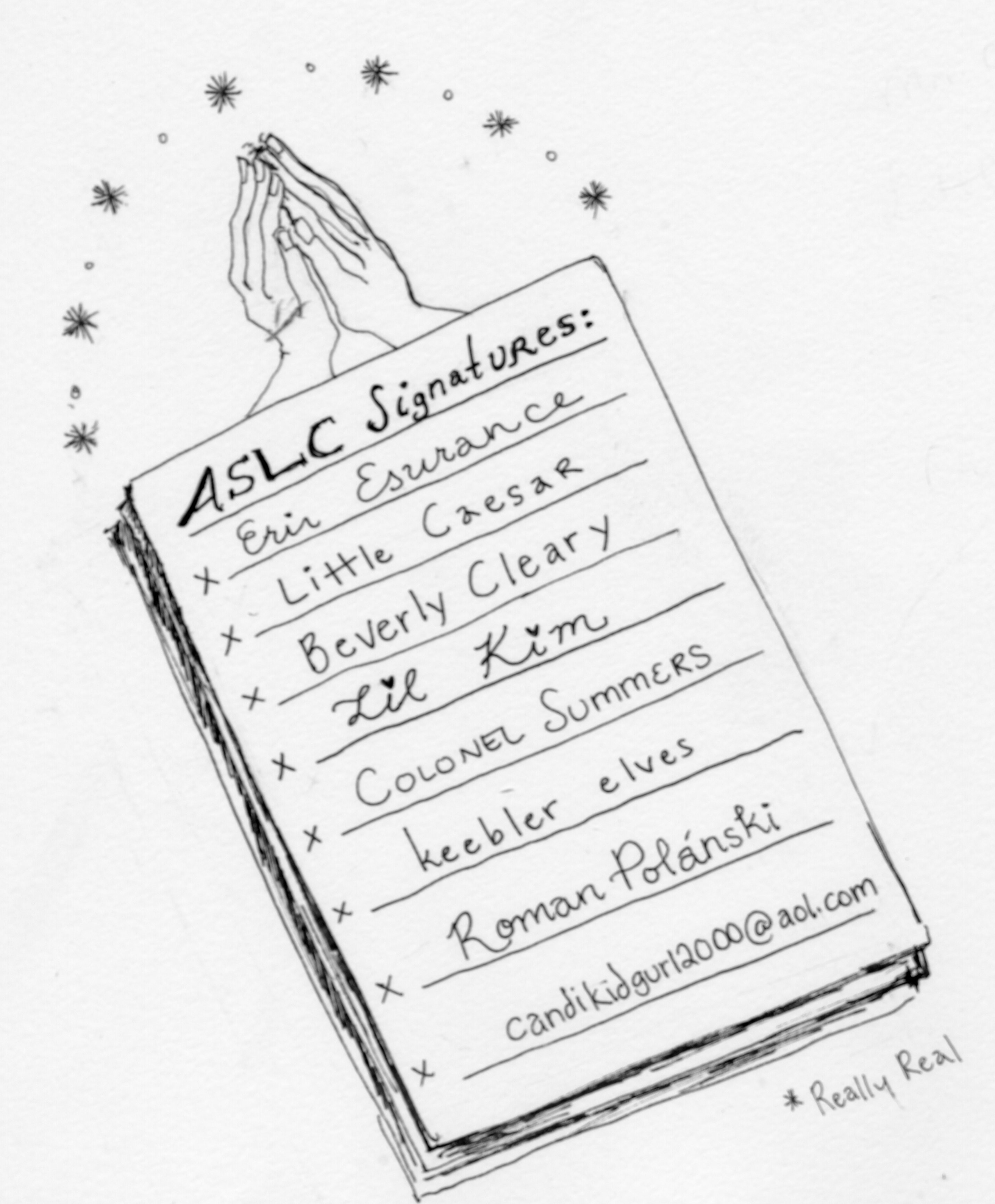
By Drake MacFarlane /// Backdoor Editor
In an ASLC senate meeting several weeks ago to pass an amendment to the ASLC constitution, senator Nathan Weisberg (’14) presented 23 petitions claiming to be able to recall almost all members of the senate.
These petitions, however, were fake.
In the wake of this spring’s special election, which elected Musa Ahmed (’14) to the ASLC presidency, the ASLC senate passed a bill to amend the recall procedures. The bill, introduced by Weisberg, sought to increase the signature threshold required to recall members of ASLC. It was passed on April 10, after much debate.
“It seemed to me that it was far too easy to initiate special elections—there were no controls on the process. You could easily misuse it or use it for personal reasons, to target someone out of a petty vendetta. To keep that from happening I introduced my bill,” Weisberg said.
The bill stipulated that for a special election to be initiated against a member of ASLC, it must be proven that he or she has violated ASLC laws, the Student Code of Conduct or “can be decisively demonstrated to have failed to fulfill the duties of their office.”
Also, the Constitutional Affairs Committee, chaired by the Chief Justice, will “determine whether or not an officer is eligible for special election.”
“There’s a clause in this new recall procedure that says anyone who has conflict of interest will recuse themselves,” Senator Charlie Patterson (’14) said. “But I can tell you firsthand that won’t happen based on how Chief Justices have acted in the past.”
Patterson, elected to ASLC senate this spring, spearheaded the petition to recall former ASLC President Callie Rice. During Weisberg’s presentation, he voiced concern over the bill.
“I think it increased the threshold to hold people accountable dramatically and, unfortunately, I don’t foresee in the future anyone really being able to use the recall procedure anymore,” Patterson said.
Weisberg’s presentation was highly controversial, with some senators comparing it to blackmail. Despite the dissenters, ASLC passed the bill on April 10.
The Pioneer Log obtained these petitions and found they were blank except for the first page. In effect, Weisberg misled the entire ASLC senate.
When confronted about this fact, Weisberg said, “I feel that in this case, the ends justify the means, that the cause I was working for was a good cause, and it was worth doing. I have no regrets.”
Patterson said, “Well, it’s politics. There’s nothing that says you can’t use false evidence to pass legislation, but I don’t think people would appreciate it.”
Tadhg Fendt (’14), another ASLC senator, thought otherwise. “The fact that he used fake petitions to basically force through legislation is pretty insidious. He created mass hysteria saying that there were going to be recalls every week. That’s the problem. That’s obscene,” Fendt said.
During the spring ASLC senate elections, Weisberg originally ran as a “joke candidate” in order to make sure that the other candidates weren’t running unopposed. Once elected, he decided to take it “very seriously.” Later, Weisberg ran for president during the special election, but lost.
Weisberg has been an open critic of student government lately. “Student government has been very internecine lately. [It’s] very focused on internal issues and protocol and procedures. When it does get involved, it gets involved in stuff most students don’t care about,” he said.
“I think that although I didn’t get signatures to recall all 23 of the senators, I’m confident that under the old rules I could have recalled at least one. Do we actually recall one senator or pretend to recall all of them? It was ultimately decided that something targeting everyone equally would be more neutral and more effective at bringing across our point,” Weisberg said.
Despite his implicature, Weisberg declined to name other ASLC members who took part in the fraud, though he maintained that former president Callie Rice was not involved.
The law makes it significantly more difficult to recall any member of ASLC. In regards to the President, it raised the number of signatures to recall the President from 200 to 400. Although Weisberg maintains that the bill is not “bad law,” others, including Patterson, prefer the old system.
“In my opinion it’s fairly foolproof,” Patterson said, “The concern around the whole thing is that they don’t trust the student body to make the decision [to recall]. That’s what it’s really about. I fundamentally disagree with that.”
Drake MacFarlane
Drake MacFarlane is the Backdoor editor of the Pioneer Log. As you can imagine, he blogs too much and used to make YouTube videos, but you’d never get him to admit it. Follow him on Twitter @drakemacfarlane
Subscribe to the Mossy Log Newsletter
Stay up to date with the goings-on at Lewis & Clark! Get the top stories or your favorite section delivered to your inbox whenever we release a new issue.

Leave a Reply